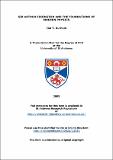Sir Arthur Eddington and the foundations of modern physics
Abstract
In this dissertation I analyze Sir Arthur Eddington's statistical theory as developed in the first six chapters of his posthumously published Fundamental Theory. In particular I look at the mathematical structure, philosophical implications, and relevancy to modern physics. This analysis is the only one of Fundamental Theory that compares it to modern quantum field theory and is the most comprehensive look at his statistical theory in four decades. Several major insights have been made in this analysis including the fact that he was able to derive Pauli's Exclusion Principle in part from Heisenberg's Uncertainty Principle. In addition the most profound general conclusion of this research is that Fundamental Theory is, in fact, an early quantum field theory, something that has never before been suggested. Contrary to the majority of historical reports and some comments by his contemporaries, this analysis shows that Eddington's later work is neither mystical nor was it that far from mainstream when it was published. My research reveals numerous profoundly deep ideas that were ahead of their time when Fundamental Theory was developed, but that have significant applicability at present. As such this analysis presents several important questions to be considered by modern philosophers of science, physicists, mathematicians, and historians. In addition it sheds new light on Eddington as a scientist and mathematician, in part indicating that his marginalization has been largely unwarranted.
Type
Thesis, PhD Doctor of Philosophy
Collections
Items in the St Andrews Research Repository are protected by copyright, with all rights reserved, unless otherwise indicated.

